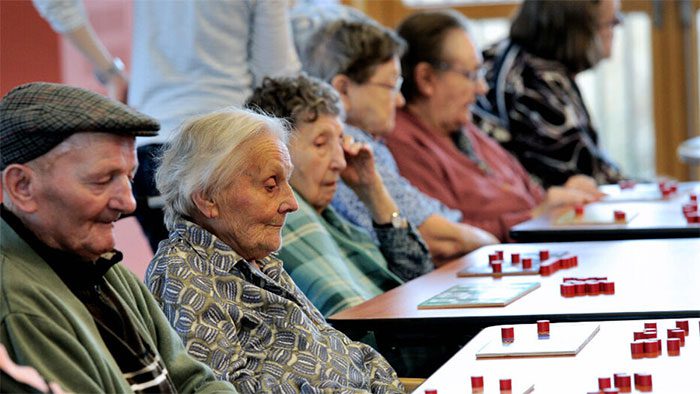Although human lifespan continues to increase, it does not mean there are no limits. Experts agree that individuals living over 115 years old remain exceedingly rare.
Helen Reichert, a resident of New York, passed away at the age of 109 while still enjoying her favorite Budweiser beer, and even intended to return to her youthful habits.
Her brother, Irving Khan, who held the record as the oldest investor on Wall Street, also died at a similar age as his sister.

Elderly residents at a nursing home in Lens, France. (Photo: AFP/TTXVN).
This age range marks the passing of the group of supercentenarians, who typically live from 110 to 115 years. Notably, Jeanne Calment, a French woman, is believed to be the only person to have lived to 122 years in 1997, surpassing the 120-year threshold.
To gain deeper insights into the ‘maximum age’ of humans and to verify whether humanity has reached its maximum lifespan, a group of mathematicians embarked on research, believing that the highest lifespan among supercentenarians could still be greater.
In a recent publication in the journal PLOS One, David McCarthy, a professor specializing in risk management at the University of Georgia, proposed the hypothesis that humans, particularly women, may live beyond 122 years in the coming decades.
According to Professor McCarthy’s mathematical analysis models, women born in 1940 in Japan could reach a maximum age of 125 to 130 years, while those born in the U.S. might achieve a maximum age of around 120 to 125 years.
McCarthy emphasized that the cumulative evidence from the mathematical models developed by the research team indicates that the maximum human lifespan is continually increasing, suggesting that the biological limits of humanity are not fixed but are expanding over time.
Under stable conditions, some individuals could surpass the current longevity records, highlighting the tendency for maximum lifespan to continue rising.
While human lifespan is on the rise, it does not imply that there are no limits. Experts maintain that people living over 115 years old are still a rarity.
In the U.S., the average lifespan is approximately 76 years, as younger Americans seem to have a tendency to die earlier. However, studies show that individuals over the age of 75 often display resilience and longevity.
Recent trends indicate an increasing number of individuals reaching their 70s, 80s, and 90s compared to previous generations.
Brandon Milholland, a former postdoctoral researcher at Albert Einstein College of Medicine and co-author of a 2016 article in Nature, asserted that the human lifespan limit has barely changed since the 1990s, with the maximum average age hovering around 115.
Milholland also does not rule out the possibility that at some point in the future, scientific advancements could enable humans to reduce biological age as lifespan increases (understood as being older but not weaker).
However, according to Milholland, the challenge lies in addressing the root causes of aging rather than merely treating its symptoms.
In fact, experts are researching various drugs to extend human lifespan. Researchers are exploring the potential of affordable medications to enhance human longevity while ensuring robust biological health.
Moreover, advancements in understanding the mechanisms behind degenerative conditions such as Alzheimer’s disease could help identify genetic trends and factors that may influence the timing of death.
Nevertheless, researchers unanimously agree that it is unlikely to have a universal formula to achieve the goal of superior aging control.
Rather, an individual’s lifespan is influenced by a multitude of complex and enigmatic factors, including genetics, lifestyle, environmental influences, and other elements.
Professor Emily Rogalski of Northwestern, a cognitive neuroscientist specializing in the brains of older adults, emphasized that there is no one-size-fits-all formula for increasing lifespan while controlling aging due to the fact that the determinants of lifespan are highly diverse and personalized, reflecting the unique interactions of various factors in each person’s life.


















































